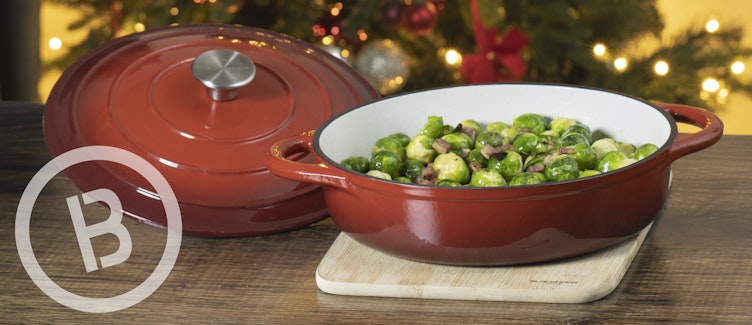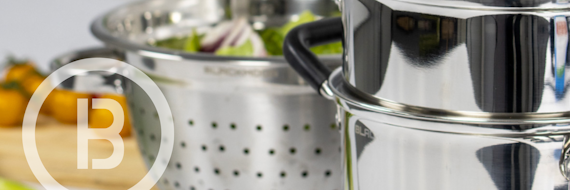

Free UK DeliveryNo Minimum Spend
30 Day Returns Policy
Buy Now Pay LaterClearpay & Klarna
Excellent ReviewsCheck out our Trustpilot Page
- Nutritionist Kate Withington shares her healthy hacks from using no oil to opting for manuka honey.
- Kate also shares her roast potato recipe and top tips for homemade stuffing.
It’s just about that time of year when we get to sit and enjoy all the culinary treats that the Easter season offers. However, for those who are watching their waistline, it can prove a little more troublesome to stay ‘on-plan’.
Kate Withington, a private nutritionist, explains how some simple hacks can create a delicious feast that saves on calories but still splurges on flavour.
Switch to rapeseed oil, olive oil or fresh air for roasting
Kate begins: “The first step for making your Easter roast healthier is to use rapeseed oil or olive oil, I always opt for Frylight’s 1cal rapeseed or olive oil spray when roasting anything such as your lamb or roast potatoes as these are both unsaturated fats and extremely low in calories. Not only do they give a beautiful crisp result, but they’re also heart-healthy, unlike the saturated fat in butter.
“Even though this is a healthier method, all fats are high in calories so you should still watch how much you use.
“If you really want to be an angel, don’t use any fats at all and opt to use a non-stick roasting tray – saves on calories and still gives a crispy result! I always use my Blackmoor Carbon Steel Roasting Tray”.
Stay traditional with lamb
Kate continues: “Lamb is great to have on an Easter dinner as it is a delicious and rich source of protein that has important vitamins and minerals. It seems that many people are drifting away from lamb and trying other Easter favourites such as gammon, beef or even duck. I would advise sticking to tradition if you are watching the waistline.
‘There are several types of fats, and each has different effects on the body. We often hear "good fats” or “bad fats", but lamb meat consists of unsaturated fat which is considered a “good fat”. These fats help prevent arteriosclerosis and blood clots, plus assist in lowering blood pressure and “bad” cholesterol levels, making it all the better for you!’
Pass me the vegetables, honey
“An Easter Sunday dinner is a great opportunity to have a huge variety of vegetables and cash in on your five-a-day,” says Kate.
“If you want to add some flavourings when cooking your veggies, I’d be grabbing my mauka honey and giving them a little coating.
“Manuka honey has lots of benefits for the body such as supporting gut health and could even offer antiviral properties and of course it still makes your food taste great.
“And remember, as a guide, include enough vegetables to cover a third to a half of your plate, this will also help keep the more calorific items to a smaller sized sin!”
All about the roasties
Kate continues: “Roast potatoes tend to be high in fat to start with so a good way to reduce the fat is to roast your potatoes in larger chunks, this will reduce the amount of fat each potato absorbs.
“Oil can be used to create the crispiest roast potatoes, but as I said earlier, make sure you’re using one of the healthier oils such as rapeseed oil or olive oil. Again, I would always opt for Frylight’s 1cal rapeseed or olive oil spray as you don’t have to worry about the calories as much as you would with another oil.
“I always pre-heat the oil in the oven and add some plain flour over the spuds to aid in their end result. I always use my trusty Carbon Steel Roasting tray and follow these steps:
- Heat oven to 190C/fan 170C/gas 5. Peel the potatoes and cut into larger chunks or in half; if very large, cut them into quarters, or leave them whole if they are small. Tip into a saucepan, cover with cold water and then bring to the boil. Set the timer and boil for exactly two mins. Drain the potatoes well, then toss in the colander to fluff up their surfaces, sprinkling over the flour as you go.
- Place a large, sturdy roasting tray over high heat, then tip in the fat and oil. (Tip: to get really crispy roast potatoes, make sure the fat or oil is really hot before you add the potatoes.) When sizzling, lower in the potatoes carefully, then gently brown in the hot fat for about five mins so all the sides are covered with oil.
- Roast undisturbed for 20 mins, then remove from the oven and gently turn them over, I use a fish slice to make this easier. Place the tray on the hob to heat the oil, then return to the oven and cook for another 20 mins. Repeat this all again and give them a final 20 mins in the oven, by which time you should have perfect roast potatoes.
Steer away from shop-bought stuffing
“If there is one food that will make the calories doubles it is stuffing,” Says Kate.
“Stuffing is typically high in calories, fat, sodium, and carbohydrates but that doesn’t mean you can’t enjoy it, you just must remember that all foods can fit into a healthy diet in moderation. So, if you’re serving yourself some stuffing – try to stay on the small side.
“One of the biggest sources of fat and calories is hiding in your stuffing. Often made with lots of bread, fatty meat, butter and other calorie-laden ingredients, the stats can quickly add up.
“In fact, a cup of stuffing can contain as much as 400 calories and more than 25 grams of fat!
“If I fancy stuffing, I make my own. Instead of using bread or rice, I chose whole grain as it is better for your health, opting for 100 per cent whole-wheat or whole-grain bread.
“I would always use lean turkey sausage instead of pork sausage as this cuts the fat content, but the taste is still really good. Turkey is a great low-fat meat and contains lots of protein helping to make the stuffing slightly healthier. If I do want a little treat, I add a little bit of bacon or prosciutto as this can add lots in the flavour department.
“Furthermore, I replace any butter used with a heart-healthy oil or even chicken stock.
“The way you season your stuffing has a lot to do with how good it tastes, so bold up the flavour with fresh herbs like sage, rosemary, thyme, and parsley. Even mixing in some pepper, cinnamon, or nutmeg for some added extra zing.”
No oil yorkies
“Yes, you heard me right, you can make impressive Yorkshire puddings with no oil,” explains Kate.
“You just need to have the right tools for the job. I make sure I use a non-stick cupcake tray, not only don’t you need any oil, but you can pop the puddings out with ease.”
“I make sure the tray is really warm before adding my mixture. If you are too nervous to try no oil, you can add some fats just again go for rapeseed or olive to help with calories and only use a splash.”
Gravy time
Kate ended: “You can make your gravy healthier by using chicken or vegetable stock instead. Simply add your choice of spices and a low carbohydrate thickening option such as whole-wheat flour to the stock.
“If you do want to stay more traditional and use the juices from the meat, first spoon off the fat and then you can always include vegetable cooking water for extra flavour and nutrients.”
